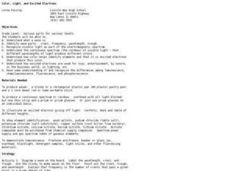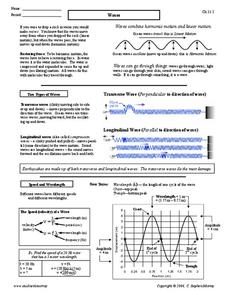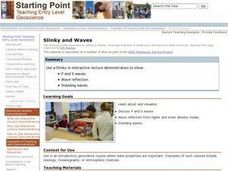Curated OER
Waves
Light waves and sound waves are the focus of this science lesson designed for 5th graders. Besides discovering how these waves travel, learners also discover the basic properties of waves, and analyze data tables and graphs. The...
National Nanotechnology Infrastructure Network
Understanding Wave Motion - Slinky vs. Snaky: Which Spring is Dominant?
Ride the wave to an understanding of refraction! The first in a series of two inquiry-based lessons challenges learners to create transverse waves with two different types of springs. As their wave hits an object, they observe the change...
Science Matters
Wave Watching
Seismologists use the direction and arrival times of p waves and s waves to determine the distance to the source of an earthquake. The engaging lesson has students line up to form human waves. Through different movements when attached,...
Cornell University
Sound Waves
How does sound travel through different mediums? Scholars explore this question by creating and observing sound waves as they learn the difference between transverse and longitudinal wave motion. Using their new knowledge, class members...
Urbana School District
Waves
What is a physicist's favorite part of sports? Doing the wave. The presentation covers longitudinal, transverse, surface, and standing waves. It includes in-depth information on frequency, wavelength, period, amplitude, reflection,...
California Department of Education
What Is a "Wave"?
Take a stretch, but don't wave goodbye. An interesting resource provides everything needed to present an introductory lesson plan on waves. Teachers present a PowerPoint defining the types of waves and their characteristics. Pupils use a...
Acoustical Society of America
Wave Basics
Catch the fast wave. Using a computer simulation, pupils experiment with amplitude, frequency, damping, and tension of a string to determine which affects the speed of the wave. Learners record the observations to determine their...
DiscoverE
Slinky® Science
Toys are great for learning about physics. Scholars use Slinky® toys to study Newton's laws of motion and types of energy. After a little play, they then model longitudinal and transverse waves with the Slinky® toys.
Curated OER
Understanding Waves
Pupils examine the physical properties of waves to explore the word crest and trough. They use toys to study waves in air, water and light.
Mr. E. Science
Characteristics of Waves
Waves, waves, and more waves. Here, class members look at the many types and characteristics of energy waves including transverse, longitudinal, standing, seismic, p-waves, s-waves, and l-waves.
Columbus City Schools
Making Waves
Learning about waves can have its ups and downs, but a demo-packed tool kit has the class "standing" for more! Learners gain experience with several different wave types, organizing observations and data, and wave...
Curated OER
Let's Do the Wave!
Learners distinguish waves from matter, differentiate between transverse and longitudinal waves, use sine curves as representations of transverse waves, label characteristic properties of waves, diagram transverse waves having specific...
Curated OER
Color, Light, and Excited Electrons
Investigate color, light and excited electrons and produce waves using slinkys. Your high schoolers will observe a continuous spectrum with a prism and an overhead projector. They observe flame tests to identify elements and they observe...
Curated OER
Playing With Science
Young scientists investigate the scientific concepts and principles that help make common toys such as hula hoops, yo-yos, slinkies, and silly putty work. As a class, they read "Backyard Rocket Science, Served Wet" to get a look behind...
Curated OER
Fundamental Properties of a Wave
Students investigate the form and motion of a wave, and examine the fundamental properties of wavelength, frequency, and amplitude. They discuss the fundamental properties of a wave, and in small groups conduct an experiment involving...
Curated OER
Slinky Movement Lab
In this wave instructional activity, students use Slinky's to observe the properties of waves. They observe longitudinal waves, transverse waves, traveling waves and standing waves and record their observations. They calculate the...
Curated OER
Waves
In this waves worksheet, learners read about the different types of waves and how the speed of waves is calculated. Then students complete 5 matching, 8 fill in the blank, and 9 short answer questions.
Curated OER
Waves
In this waves worksheet, students read about harmonic and linear motion in waves as well as the two types of waves. They match 5 terms to their definitions about the structure of waves, they solve for the wavelength, frequency and...
Curated OER
Waves Interference
Students identify different wave types and their characteristics. In this wave instructional activity students complete activities by activating tuning forks and interpreting data.
Curated OER
Slinky and Waves
Young scholars watch a demonstration using a Slinky during a lecture on basic wave properties. Properties addressed in the demo include wave speed, wave length, amplitude, period, and frequency.
Curated OER
How Do I Make My Own P and S Waves
In this P and S waves worksheet, students use a Slinky to simulate P and S waves showing compressional and dilational motion.
Curated OER
Dynamic Earth
Young scholars show how earthquakes affect sea waves. In this tidal waves instructional activity students use a rubber mallet on a table to create waves in a box on top of the table. They experiment with striking the mallet in different...
Curated OER
Slinky Lab- Simulating the Motion of Earthquake Waves
Sixth graders simulate primary and secondary waves. In this earthquakes waves lesson, 6th graders experiment using a slinky to gain understanding of how waves are created during an earthquake. Students record observations in drawings....
Curated OER
Seismic Waves
Students identify the four types of seismic waves, their characteristics and effects. Then they predict the level of damage each wave might cause in a residential area and test their predictions against several computer animations. ...























